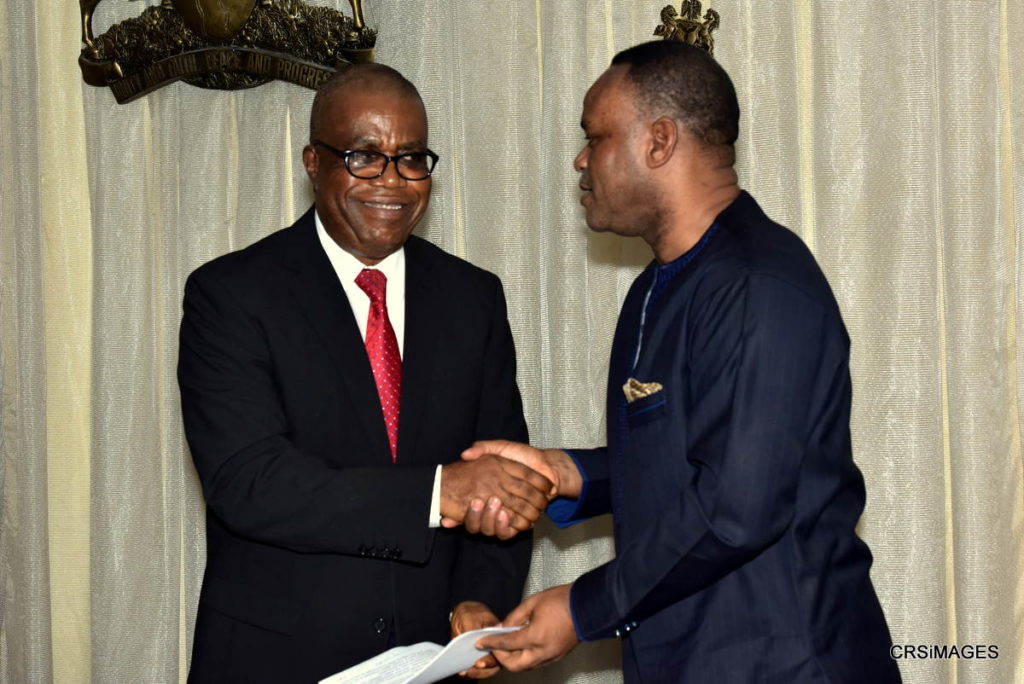By Jonathan Ugbal; Government House Correspondent

The Governments of Cross River and Ebonyi states have agreed on new terms to fast-track the processes aimed at resolving recurring conflicts between communities located at the Cross River/Ebonyi interstate boundary.
This was contained in a communique issued at the end of a joint meeting of officials of both states on the challenges at the flash points along the Cross River/Ebonyi interstate boundary and the way forward held Tuesday at the Governor’s office in Calabar where both agreed to inaugurate the Governor’s committee as reconstituted on June 10, 2015.
“The National Boundary Commission and both states shall jointly initiate action on the resumption of the delineation of the Ebonyi/Cross River interstate boundary not later than Monday 27th February 2017,” reads the communique jointly signed by the Deputy Governor of Cross River State, Professor Ivara Esu and his Ebonyi state counterpart, Barrister Eric Igwe.
Both states agreed to communicate “separately”, their reports to the commission for concurrence and are to inaugurate the peace committees at the various levels.
The Police, Army and Civil Defence corps were encourage to patrol the flash points with the Police charged to commence investigations into reported criminal activities within the affected areas which are Ukelle in Yala local government of Cross River and Izzi local government in Ebonyi, Osopong 1 and 2 in Obubra local government of Cross River and Abakaliki and Izzi local governments in Ebonyi as well as Adadama in Abi local government area of Cross River and Amagu in Ikwo local government area of Ebonyi state.
Also, the terms of reference for the various peace committees as stipulated at the June 2015 meeting were adopted verbatim.
Earlier, Professor Esu in his remarks said the meeting was part of ongoing efforts to resolve the issues surrounding the conflicts; a situation he said is “totally unnecessary” as lives are often lost in very gruesome as well as barbaric manners and explained the reason for the meeting.
“It is a meeting that is supposed to let us know where we are at the moment and more or less chart the way forward. For instance, are there boundary issues that are involved? Is there a situation in which the boundaries have not been properly demarcated? If so, how far have we gone in the demarcation of such borders? And how can this process be accelerated?
Do we have vandalism that is just perpetrated by some vandals living in the areas? If so, how do we solve this problem? Do we have people struggling for farmland and other things? And if so, how do we solve this problem?”
However, he explained that; “At the meeting of the Governors, which will either take place at Abakaliki or here in Calabar, we will then distill all these issues and the Governors will take their executive authority to decide or approach National Boundary Commission to ensure that such boundary issues are concluded even if it is at the cost of the two governments, because at the end of the day, it is our own people who are suffering and we will like this suffering to end.
“If it is a case of inadequacy in terms of policing those borders, we will also know whether there will be need to have more police posts in those areas and so on and so forth.”
In a similar vein, his Ebonyi counterpart said he strongly believed that the meeting will move the peace process forward with a view to arriving at final settlements in the spirit of “give and take”.
Pointing out that; “Boundaries are made by Governments for administrative convenience and therefore not intended to bring enmity or hostility between border communities as witnessed sporadically in the recent past”, Igwe posited that; “We think that border and boundary issues are not matters that will consume lives of promising young men in our society.”
Furthermore, he called on all those participating in the peace process “Not to get tired of efforts geared towards finding lasting solutions of our boundary issues as this will go a long way in bringing peace and unity to the two states in particular and Nigeria in general.
“At this point in time, our nation we know is doing all it can to catch up with developed worlds and the importance of peace and neighborliness cannot be overemphasized for this is a vehicle and a veritable tool in stability and nation building. The time for us to emphasize those bonds that hold us together as one people has come.”
The meeting was attended by Service Commanders, legislators, traditional rulers and top government functionaries from both states.
Since You Are Here, Support Good JournalismCrossRiverWatch was founded on the ideals of deploying tech tools to report in an ethical manner, news, views and analysis with a narrative that ensures transparency in governance, a good society and an accountable democracy. Everyone appreciates good journalism but it costs a lot of money. Nonetheless, it cannot be sacrificed on the altar of news commercialization. Consider making a modest contribution to support CrossRiverWatch's journalism of credibility and integrity in order to ensure that all have continuous free access to our noble endeavor. CLICK HERE |
New Feature: Don't miss any of our news again.Get all our articles in your facebook chat box.Click the Facebook Messenger Icon below to subscribe now
Text Advert by CRWatch :Place Yours
Will You To Learn How To Make Millions Of Naira Making Special Creams From Your Kitchen?.Click Here
Expose Your Business And Make More Sales. Advertise On CrossRiverWatch.com Today